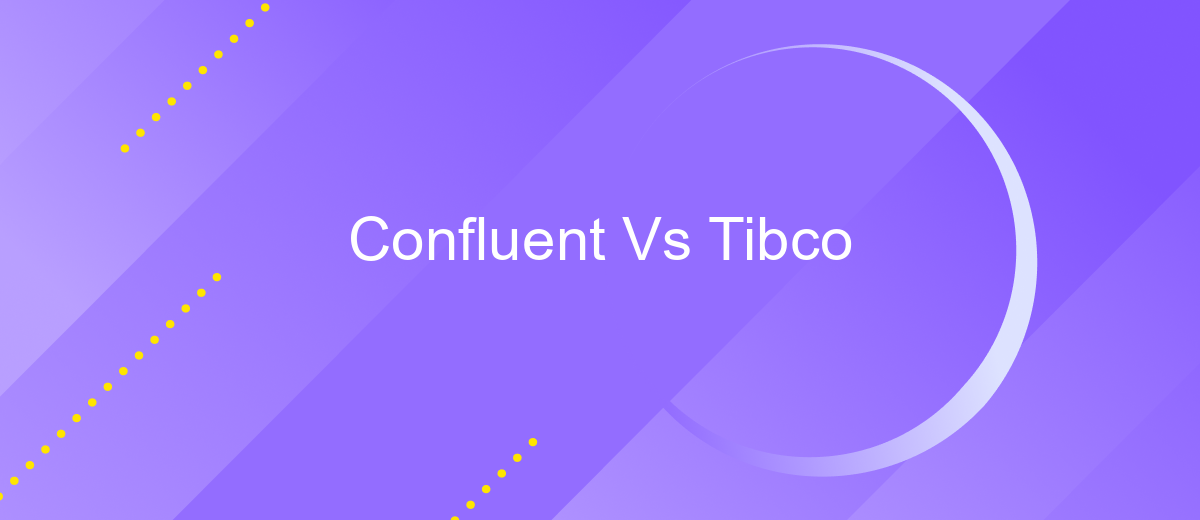Confluent Vs Tibco
In the rapidly evolving world of data integration and real-time analytics, choosing the right platform is crucial for business success. Confluent and Tibco are two leading contenders in this space, each offering unique features and capabilities. This article aims to provide a comparative analysis of Confluent and Tibco, helping you make an informed decision for your enterprise needs.
Introduction
In today's rapidly evolving digital landscape, businesses are constantly seeking robust and efficient solutions for data integration and real-time analytics. Confluent and Tibco are two prominent platforms that offer powerful tools to meet these demands. Understanding the differences and unique capabilities of each can help organizations make informed decisions about which platform best suits their needs.
- Confluent: Built on Apache Kafka, Confluent excels in real-time data streaming and event-driven architectures.
- Tibco: Known for its comprehensive suite of integration and analytics tools, Tibco provides robust solutions for data management and business intelligence.
- ApiX-Drive: Facilitates seamless integration between various applications and services, enhancing the capabilities of both Confluent and Tibco.
Choosing between Confluent and Tibco involves evaluating specific business requirements, such as the need for real-time data processing, integration complexity, and scalability. By leveraging platforms like ApiX-Drive, organizations can enhance their integration processes, ensuring smoother and more efficient data flow across systems. This comparison aims to provide insights into the strengths and potential use cases of Confluent and Tibco, helping businesses navigate their integration and analytics strategies effectively.
Overview of Confluent and Tibco

Confluent is a comprehensive platform for data streaming, built on Apache Kafka. It provides a robust infrastructure for real-time data processing and event-driven architectures, enabling businesses to build scalable and resilient data pipelines. Confluent's key features include data integration, stream processing, and enterprise-grade security. It supports seamless integration with various data sources and sinks, making it an ideal choice for organizations looking to leverage real-time data analytics.
On the other hand, Tibco is a leading provider of integration, analytics, and event-processing software. Tibco's suite of tools facilitates the seamless integration of disparate systems, enabling businesses to harness the power of their data. With a strong focus on real-time data processing and analytics, Tibco offers solutions for data visualization, predictive analytics, and business process management. For organizations seeking to streamline their integration processes, services like ApiX-Drive can be invaluable, offering automated workflows and easy-to-use interfaces to connect various applications and services.
Comparison of Features and Functionality

When comparing Confluent and Tibco, it's essential to consider their features and functionality. Both platforms offer robust solutions for data integration and real-time processing, but they cater to slightly different needs.
- Data Streaming: Confluent excels in real-time data streaming using Apache Kafka, providing high throughput and low latency. Tibco, while capable, primarily focuses on enterprise application integration.
- Integration Capabilities: Tibco offers extensive integration tools and supports a wide range of protocols and applications. Confluent focuses on Kafka-based integrations but can be extended using third-party services like ApiX-Drive for broader compatibility.
- Scalability: Confluent is designed for horizontal scalability, making it ideal for large-scale data processing. Tibco provides scalability but often requires more complex configurations.
- Ease of Use: Tibco features a user-friendly interface with drag-and-drop capabilities, while Confluent may require more technical expertise to set up and maintain.
- Support and Community: Confluent benefits from a strong open-source community and extensive documentation. Tibco offers dedicated enterprise support with comprehensive resources.
In summary, Confluent is a powerful choice for real-time data streaming and scalability, while Tibco shines in enterprise integration and ease of use. The choice between the two depends on specific business needs and technical requirements.
Pricing and Licensing

When comparing Confluent and Tibco, understanding their pricing and licensing structures is crucial for making an informed decision. Confluent offers a flexible pricing model with options for both cloud and on-premises deployments. Their subscription plans are based on the number of clusters and data throughput, providing scalability for growing businesses.
On the other hand, Tibco employs a more traditional licensing approach with perpetual licenses and annual maintenance fees. Tibco's pricing is often tailored to the specific needs of the enterprise, making it essential to engage with their sales team for a detailed quote.
- Confluent: Subscription-based, scalable pricing
- Tibco: Perpetual licenses with annual maintenance
- Confluent: Cloud and on-premises options
- Tibco: Custom quotes based on enterprise needs
Both Confluent and Tibco offer robust integration capabilities, but if you require additional help in setting up integrations, services like ApiX-Drive can be invaluable. ApiX-Drive simplifies the process of connecting various applications and automating workflows, ensuring seamless data flow between Confluent or Tibco and your existing systems.
Conclusion
In conclusion, both Confluent and Tibco offer robust solutions for data integration and real-time analytics, each with its own set of strengths and weaknesses. Confluent excels in handling real-time data streams with its Kafka-based architecture, making it ideal for organizations that prioritize scalability and performance. On the other hand, Tibco provides a more comprehensive suite of tools for various integration needs, making it a versatile choice for businesses requiring a wide range of integration capabilities.
When deciding between Confluent and Tibco, it's crucial to consider your organization's specific requirements and existing infrastructure. For those looking to simplify the integration process, services like ApiX-Drive can be invaluable. ApiX-Drive allows for seamless integration of various applications and services, reducing the complexity and time required for setup. Ultimately, the choice between Confluent and Tibco should align with your strategic goals, ensuring that you leverage the right tools to drive your business forward.
- Automate the work of an online store or landing
- Empower through integration
- Don't spend money on programmers and integrators
- Save time by automating routine tasks
FAQ
What are the primary differences between Confluent and Tibco?
Which platform is better for real-time data processing?
How do Confluent and Tibco handle scalability?
What are the deployment options for Confluent and Tibco?
How can I integrate Confluent or Tibco with other systems?
Routine tasks take a lot of time from employees? Do they burn out, do not have enough working day for the main duties and important things? Do you understand that the only way out of this situation in modern realities is automation? Try Apix-Drive for free and make sure that the online connector in 5 minutes of setting up integration will remove a significant part of the routine from your life and free up time for you and your employees.


